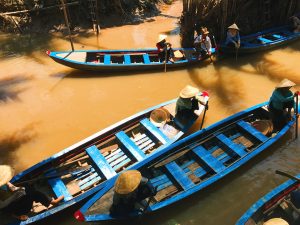A Melbourne law student is suing the Australian government for failing to disclose the risks posed by climate change. If successful, the case could present legal options in Southeast Asia for the pursuit of environmental vandals in government and the corporate world.
Katta O’Donnell, 23, is the head litigant for a world-first class action suit focusing on the threats posed by climate change to retirement funds and what are considered other safe investments.
Filed in the Australian Federal Court, the suit alleges the government, as well as two government officials, had failed in a duty to disclose how climate change would impact the market value of government bonds.
“I’m suing the government because I’m 23 [and] I think I need to be aware of the risks to my money and to the whole of society and the Australian economy,” O’Donnell told Australian media.
“I think the government needs to stop keeping us in the dark so we can be aware of the risks that we’re all faced with.”
Should she succeed, then such a case would make the Commonwealth law books in London and set an international precedent on transparency and the risks of climate change.
That could be used in former British colonies like Singapore and Malaysia over issues like the putrid annual haze that envelopes the region almost annually.
The haze, caused by burning-off and land clearing for palm oil plantations in Indonesia, has cost billions of dollars with flights suspended, workplaces and schools closed, and too often people unable to leave their homes.
A study by two universities in the United States estimated that about 100,000 people died prematurely because of the haze in 2015 alone.
Many of those plantations are controlled by companies registered and listed on stock markets in Singapore and Malaysia, and this would be a consideration for potential litigants living elsewhere among the 10 countries that make up the Association of South East Asian Nations (ASEAN).
The Mekong River would be another focus.
The river is being spoiled by a cascade of dams in Laos and China and climate change-induced problems amid a lack of transparency from governments and corporations. Fish stocks and water supplies for about 70 million people are depleted.
Drought has also engulfed the Lower Mekong Basin for a second year in a row, which scientists say has been made all the worse by climate change impacts on the Indian monsoon, a key driver of weather patterns across Southeast Asia.
All five Mekong countries – Thailand, Myanmar, Laos, Cambodia, and Vietnam – are one-party states or military-backed governments where the politically connected have profited handsomely off dam construction while ignoring the scientific warnings surrounding climate change.
These attitudes and the results of government policies – whether dealing with the haze or the Mekong River – have been well documented for more than 20 years. It’s a potential matter for the international courts, outside the political influence of state-controlled court systems.
Rob Henderson, chief economist at National Australia Bank, told ABC television network that Australian government bonds were significantly more exposed to climate change than elsewhere and likened that exposure to bushfires, which forced governments to spend money.
For such reasons Sweden’s central bank has already divested itself from state government bonds issued by Western Australian and Queensland, as well as bonds from the oil-rich Canadian province of Alberta, because of climate change.
O’Donnell said she hoped her suit would change the way Australia handled climate change. The lawsuit, if successful, could also force a major rethink within the corridors of power in Southeast Asia where policy has been driven solely by profits for the few, and at the expense of many.
Luke Hunt can be followed on Twitter @lukeanthonyhunt

































